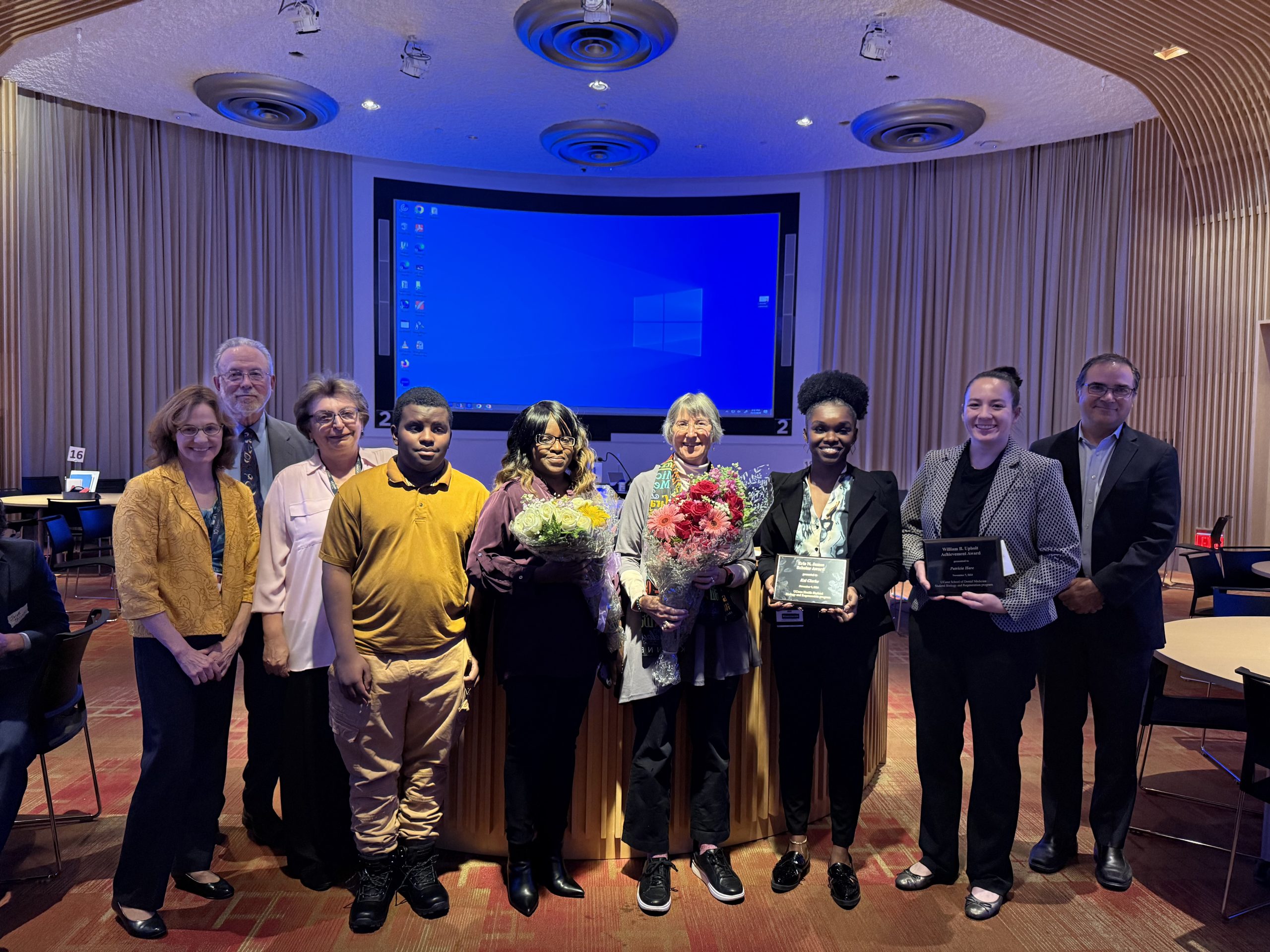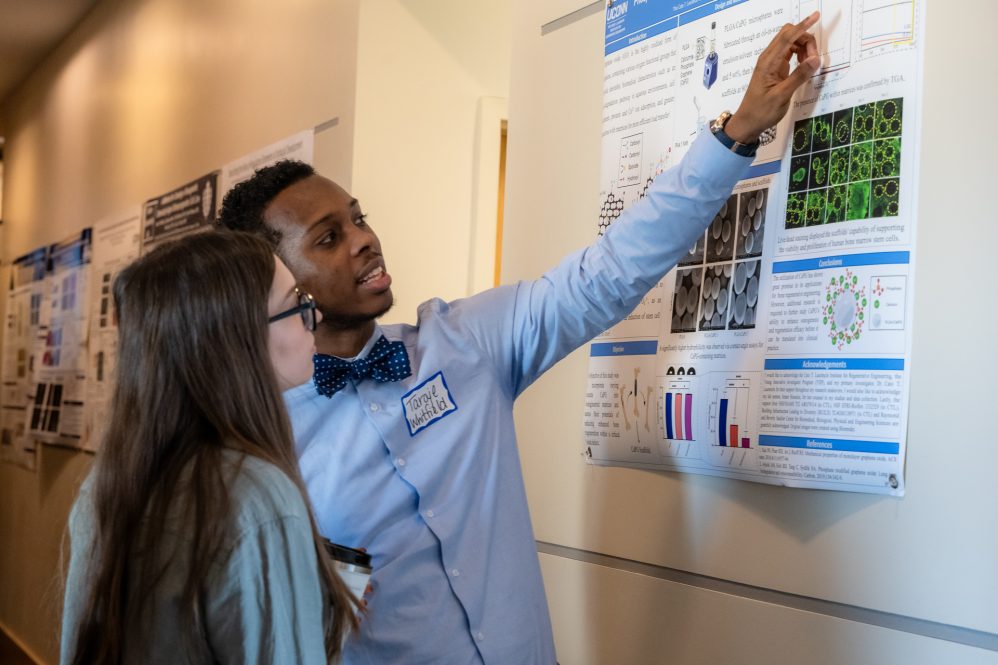Students, trainees, and faculty gathered in the Academic Rotunda to celebrate the research achievements of the trainees of the T90/R90 research training grants, Skeletal Biology and Regeneration, and biomedical engineering programs during the 2024 Skeletal, Craniofacial, and Oral Biology Training Program Symposium.
Dr. Mina Mina, professor and chair of pediatric dentistry, director of the DMD/Ph.D. program, and co-director of the training grant, said: “Today’s symposium continues the long-standing tradition that began in 2002. The Skeletal, Craniofacial & Oral Biology Training Program has been funded by NIDCR for 41 years. During this time, the T32 and T90/R90 programs have graduated 86 trainees, including 17 combined residency/Ph.D., 25 DMD/Ph.D., and 14 Ph.D. students. This program also has supported 31 postdoctoral fellows. Currently, the program supports 8 trainees, including 4 Ph.D. students, 2 DMD/Ph.D. students, and 2 postdoctoral fellows. The success of this training program is due to accomplishments and distinguished careers of past and present trainees.”
“This symposium is a fitting platform to recognize the incredible talent of the program’s students and trainees,” said School of Dental Medicine Dean Dr. Steven Lepowsky during the opening ceremony. “As you review today’s program and as you hear the oral sessions and visit the posters, I am confident that you will be impressed with quality of their work and will agree that the future of scientific discovery in dental, oral, craniofacial and biomedical research is very bright.”
The symposium included student poster presentations and an award ceremony to recognize the recipients of the two prestigious and highly competitive Skeletal Biology and Regeneration awards, the William B. Upholt Achievement Award and Eric N. James Scholar Awards for outstanding academic scholarliness, research, leadership, service and advocacy.
The awards selection committee—made up of a group of faculty members—noted that they received a record number of applications for awards this year.

Kai Clarke, a Ph.D. candidate in the UConn Health Biomedical Sciences Ph.D. program, is the winner of the Eric N. James Scholar Award. Clarke is mentored by Dr. Marja Hurley, a professor of orthopaedic surgery. The Eric N. James Scholar Award honors James’ scientific achievements and reflects his deep commitment to helping others through teaching and mentorship. James’ family was also in attendance for the award ceremony.
“Though I was not one of the many fortunate people that got to interact with Dr. James, the stories about his work and his nature have lived on,” Clarke said. “My hope that this award gives comfort to his family and encourage us to embody the spirit of Dr. James. There is room for all of us in this space.”
Patricia Hare, a DMD/Ph.D. candidate, is the winner of the William B. Upholt Student Achievement Award. Her mentor is Dr. Wendy Mok, assistant professor in the Department of Molecular Biology and Biophysics. Hare also recently won an award from the Connecticut Technology Council.
The William B. Upholt Achievement Award was established to honor former SBR director Dr. William Upholt’s impact on research and graduate education, as well as his lifelong personal commitment to human rights, civic activism, and to the environment. Upholt’s wife, Mary Lee, gave Hare the award.
“It’s an honor to be recognized with an award named for someone who had such an impact on this institution,” said Hare. “ I was touched that Dr. Upholt’s wife came to give the award and said that, as a self-described non-scientist, she really enjoyed reading my research statement. It’s one of the best compliments I could receive, to know that I’m effectively communicating the exciting work we’re doing in the Mok Lab.”
After the awards ceremony, Mina was honored by Dr. Frank Nichols, professor of periodontology, for her many years of contributions to the T90/R90 research training program.
“It’s really amazing what you’ve accomplished, we are deeply indebted to you,” said Nichols, who also noted that an award will be established in her name for next year’s symposium.
Mary Ellen Davey, Ph.D., of the Forsyth Institute, was the symposium guest speaker. Davey presented her research, The pathophysiology of Porphyromonas gingivalis.
The SBR program at UConn Health focuses on the cellular, molecular, and genetic processes related to skeletal development, diseases, injuries, and their regeneration. Research labs within SBR also focus on the biomechanical and material properties of skeletal components in health and in diseased states, as well as novel regenerative engineering approaches. The program, which includes over 25 research labs, spans both the Schools of Dental Medicine and Medicine.
The UConn-NIDCR T90/R90 Research Training Program supports and enhances the training of individuals preparing to be independent scientists in academics, industry and government, and related careers. The program is an interdisciplinary, research-intensive training program that primarily focuses on skeletal, craniofacial, and oral biology research. Research mentors are from the School of Dental Medicine, the School of Medicine, and the Jackson Laboratory for Genomic Medicine, with additional advisors and resources available at the UConn Storrs campus.
The William B. Upholt and Eric N. James Scholar awards are made possible thanks to the generous donations from SBR alumni and faculty, private donors, and the School of Dental Medicine. Additional support for this event was provided by the UConn Foundation and T90/R90 program.



